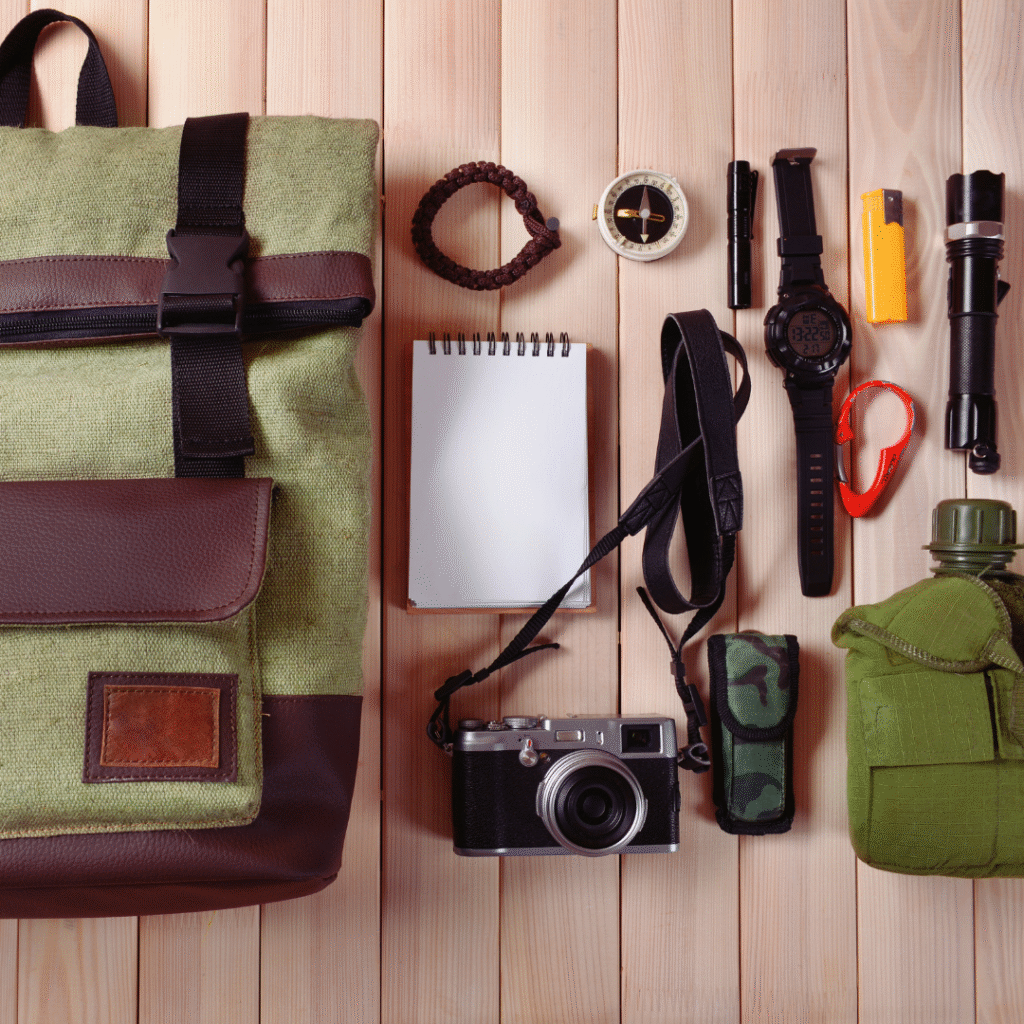For the eco-conscious explorer, the right travel gear can significantly enhance the journey while minimising environmental impact. Sustainable travel gear is designed to reduce waste and support ethical practices, making it an essential choice for anyone committed to eco-friendly travel. With options ranging from reusable water bottles to biodegradable toiletries, there are many ways for travellers to make responsible choices.
Embracing sustainability during adventures not only benefits the planet but also enriches the travel experience. Thoughtfully selected gear can lead to a lighter footprint, whether exploring nature or engaging with local cultures. As awareness of environmental issues grows, so does the demand for products that harmonise with nature rather than harm it.
By investing in sustainable gear, travellers can contribute positively to the destinations they visit. The right equipment allows for exploration without compromise, promoting a mindful approach to travel that resonates with those seeking to make a difference.
Key Principles of Sustainable Travel Gear
Sustainable travel gear prioritises the environmental impact of products designed for exploration. Key considerations include the materials used, the lifecycle of the products, and their overall ecological footprint.
Understanding Sustainability in Travel
Sustainability in travel focuses on reducing the negative impact on the environment. Eco-conscious explorers seek products made from renewable, biodegradable, or recycled materials.
Sustainable gear often incorporates certifications, such as the Global Organic Textile Standard (GOTS) or Fair Trade. These indicators certify that items meet specific environmental and ethical standards.
Additionally, many brands focus on local production to reduce transportation-related emissions. Supporting local artisans can also contribute positively to the local economy.
The Benefits of Eco-Friendly Products
Eco-friendly travel products offer multiple advantages. They are designed to minimise harm to the environment. Many items are crafted using sustainable practices, which often results in higher durability.
Users might find that sustainable gear, such as reusable water bottles or biodegradable camping supplies, saves money over time due to their longevity.
Moreover, eco-friendly products support ethical labour practices, ensuring fair wages and working conditions for those involved in production. This aspect appeals to consumers who value integrity in the products they purchase.
Minimising Carbon Footprint and Emissions
Minimising carbon emissions is essential for eco-conscious travel. Selecting gear made from low-impact materials can significantly reduce an explorer’s carbon footprint.
Products designed for multiple uses are also advantageous, as they decrease reliance on single-use items. For instance, a versatile backpack can serve for hiking, daily commuting, or travel, satisfying various needs without excess waste.
Choosing brands that utilise eco-friendly shipping practices further reduces emissions. Shipping products using sustainable methods helps in lessening the environmental impact associated with transportation.
Explorers can contribute to sustainable tourism by prioritising gear that embodies these principles. Each choice plays a role in promoting a healthier planet.
Essential Eco-Conscious Travel Gear
Selecting the right gear is crucial for eco-conscious travellers. The following categories highlight essential items that align with sustainable practices, prioritising recycled materials and innovative designs.
Eco-Friendly Backpacks and Bags
Eco-friendly backpacks and bags are central to sustainable travel. Many brands now create products using recycled materials, reducing waste and resource consumption.
Types of Backpacks:
- Hiking Backpacks: Designed for durability and comfort on trails.
- Cycling Backpacks: Feature water-resistant fabrics and reflectors for safety.
- Children’s Backpacks: Made with non-toxic materials, offering safety for younger travellers.
- Laptop Bags: Provide protection for electronics while being eco-conscious.
The use of sustainable fabrics, such as organic cotton and recycled polyester, ensures that these bags not only perform well but also leave a lighter footprint.
Sustainable Clothing for Explorers
When packing for adventure, sustainable clothing options are essential. Eco-friendly garments often feature materials like organic cotton, hemp, or recycled polyester.
Types of Clothing:
- Hoodies: Made from recycled fabrics, offering warmth and comfort.
- Base Layers: Moisture-wicking materials reduce odour and can be reused without frequent washing.
- Outdoor Trousers: Designed for movement and made from durable, eco-conscious fibres.
Investing in high-quality sustainable clothing ensures longevity and reduces the need for frequent replacements. Choosing versatile pieces can optimise packing while maintaining a commitment to sustainability.
Reusable Pads and Towels
Reusable pads and towels are vital for reducing waste while travelling. Single-use items contribute significantly to pollution, so eco-conscious travellers should consider alternatives.
Options Available:
- Reusable Pads: Made from soft, absorbent fabrics, they provide comfort and sustainability.
- Microfibre Towels: Lightweight and quick-drying, these towels are a practical eco-friendly choice.
- Cleaning Cloths: Ideal for various purposes, they reduce reliance on disposable products.
Using these items supports a reduction in landfill contributions and promotes a more sustainable lifestyle on the road.
Environmentally-Friendly Shelter and Sleeping Gear
Choosing the right shelter and sleeping gear is essential for a sustainable camping experience. Many brands develop eco-friendly tents and sleeping bags with minimal environmental impact.
Tent Options:
- Recycled Material Tents: Made with fabrics that have been repurposed, offering lightweight and weather-resistant solutions.
Sleeping Bags:
- Insulation Options: Look for bags filled with recycled synthetic materials or responsibly sourced down.
Together, these options ensure a comfortable night’s sleep while supporting environmental conservation efforts. Prioritising eco-friendly gear enhances the travel experience and promotes a sustainable future.
Choosing Low-Impact Activities and Transportation
Selecting low-impact activities and transportation is essential for travellers aiming to minimise their environmental footprint. This approach not only protects natural resources but also promotes sustainable tourism practices.
Selecting Sustainable Outdoor Activities
Eco-conscious explorers should prioritise activities that have minimal environmental impact. Hiking and trekking are excellent choices due to their low resource demand. Opting for local trails reduces carbon footprints and supports surrounding communities.
When choosing activities, consider those that promote conservation and education, such as guided nature walks or wildlife watching with certified eco-tour operators. These experiences often integrate renewable energy solutions, like solar-powered facilities.
To further reduce impact, limit group sizes during outdoor activities. Larger groups can cause erosion and disrupt wildlife. Activities like birdwatching or photography encourage appreciation for nature while fostering a sense of stewardship for delicate ecosystems.
Reducing Environmental Impact Through Travel Choices
Transportation plays a significant role in sustainable travel. Travellers should explore eco-friendly options, such as public transport, cycling, or walking, to avoid contributing to air pollution and carbon emissions.
When public transport isn’t feasible, consider using electric or hybrid vehicles. These options typically rely on renewable energy and produce fewer emissions than traditional vehicles.
Additionally, selecting accommodations that follow sustainable practices enhances the overall low-impact travel experience. Look for hotels or lodges committed to eco-friendly initiatives, such as energy-efficient facilities, waste reduction, and local sourcing of food. This not only supports responsible tourism but also conserves resources for future generations.
Maintenance, Repair and Responsible Use
Caring for travel gear is essential for ensuring longevity and minimising environmental impact. Proper maintenance and repair not only extend the life of equipment but also contribute to sustainable travel practices. The following sections address important aspects of gear care.
Repair and Longevity of Travel Gear
Regular maintenance helps travel gear perform efficiently. Simple tasks like cleaning, checking for damages, and proper storage can significantly extend its lifespan.
Repair Guidelines:
- Identify damage: Inspect items before and after trips for tears, broken zippers, or loose seams.
- DIY fixes: Familiarise with basic repairs. Use a sewing kit for fabric items and multi-tools for hard gear.
- Professional repairs: For complex issues, utilise local repair services that specialise in outdoor equipment.
Choosing gear made from recycled materials can also enhance sustainability. When purchasing, look for brands that provide repair services or warranties. This practice encourages manufacturers to create durable products and empowers consumers to invest in quality.
First Aid and Safety Preparedness
Every trip should include a well-stocked first aid kit tailored to the nature of the adventure. This kit should contain essential items to manage common injuries and emergencies.
First Aid Kit Essentials:
- Adhesive bandages
- Antiseptic wipes
- Pain relief medication
- Emergency contact information
- Personal medications
Training in basic first aid can empower travellers to handle situations confidently. Familiarity with safety protocols, such as Leave No Trace principles, ensures that explorers minimise their environmental impact while protecting themselves. Awareness of surroundings and proper gear usage enhances safety for both the individual and the environment.

